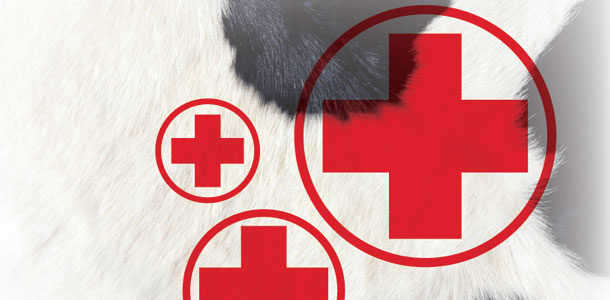Vets have always been in the vanguard and served as the front lines for the detection and reporting of foreign animal diseases. We have been exceedingly fortunate in the U.S. to have not experienced a recent outbreak of foot-and-mouth disease, for example. It is unrealistic to envision that this status will continue indefinitely. Should an outbreak of foot-and-mouth or any other foreign animal disease occur, it will be your vet who is trained to make the initial diagnosis and take steps to immediately contain a potentially catastrophic disease outbreak.
And while dairy vets play a critical role in national biosecurity, they play a just as important and more relevant day-to-day role in on-farm biosecurity.
What does biosecurity mean on your farm? It can be the choice of the proper disinfectant for your boot wash or which disinfectant to use to clean calf-feeding utensils. It can mean changing needles between every cow or between every three to five at the least.
Rectal sleeves, as well, should be changed frequently to prevent the spread of diseases such as bovine leukosis, and should ideally be done between every cow.
Biosecurity means obtaining an accurate diagnosis of the cause of death and illness through necropsy and submission of samples for lab testing.
Your vet is concerned not only with the spread of diseases from animal to animal but those which can spread to people, called zoonotic diseases, as well. Common zoonotic diseases on dairies include salmonellosis, cryptosporidiosis and leptospirosis.
Veterinarians play an important role in quality control. No matter what the specific mechanical task dairy workers perform, there eventually is procedural “drift” due to staff complacency or turnover. Often, farms are too busy to adequately train a new hire in a timely fashion. This can result in a period of poor task success, the ingraining of bad habits and poor animal welfare.
To the uninformed, it is tempting to believe that once a technical task is mastered, that is all there is to know about a particular task. Vets are invaluable in training, retraining and updating workers’ skills as new knowledge becomes available.
Animal welfare has always been in the domain of the dairy veterinarian, and vets will have an increased role in dairy cow welfare in the future as farms increase in size and economic concerns tend to relegate the dairy cow to the role or perception of being merely a production unit.
So-called population medicine raises concerns from the consumer, who is concerned with the role of the individual cow and not just its role as an economic unit.
Right or wrong, as the welfare issue progresses, difficult questions may begin to be asked, such as: Does the individual cow merit (and deserve) examination and treatment by a medical professional rather than nonprofessionals?
Is it a welfare offense for her to be subjected to surgery by a layman employee, as some state legislatures have permitted? Are standard operating procedures (SOPs) good medical practice?
I will venture to say that SOPs, while currently a practical and economic necessity, neglect the particular, peculiar and specific needs of the individual patient. They are a compromise and often are a crutch or secondary substitute for individual care and diagnosis, as each individual is physiologically and medically unique and, thus, has different therapeutic requirements than the next case or individual.
The veterinarian will play an increasingly crucial role in alleviating animal suffering through developing and monitoring the farm’s herd health policy and programs, including the euthanasia policy as well as assisting with welfare audits.
Your local vet is also a formidable source of valuable advice. Advice in general is an interesting subject to examine. One can seek advice, or advice can be unsolicited or gratuitous. It can be free and ultimately expensive if it is unqualified and followed, or paid for and worthless if it is good and ignored.
Your herd vet generally offers good, unbiased advice. He or she is not (or shouldn’t be) receiving a commission for the sale of any supplement, drug or vaccine. In my opinion, there is great value to unbiased advice provided by an informed, invested adviser such as is available from your herd veterinarian.
“Doctor Google” is a term familiar to anyone who surfs the web seeking medical advice. Who among us has not experienced vague medical symptoms and done a Google search to avoid going to the doctor? And who has not become convinced they are suffering from some obscure disease, sure to die a horrible death within days? I’m being facetious, but dairymen are no different than the rest of humanity.
With greater frequency, those in veterinary professions find themselves being second-guessed by Dr. Google. On the surface, it is a good thing. It demonstrates an inquisitive mind and a concern for the patient and herd. On the other hand, it may also mean that the owner will, instead of calling the vet first, begin treatment without a diagnosis.
Often, this approach delays an accurate and professional diagnosis, and patient health suffers. By all means, consult with Dr. Google, but please remember to defer to and take advantage of the experience and judgment of your local veterinarian. The computer between their ears is still the best computer and search engine in existence.
Predicting the future is fraught with danger and inaccuracy. If stockbrokers were always correct, we’d all be billionaires. Life has a habit of surprising us. I’d like to think that the day of the traditional dairy vet is not yet done.
Time will tell. The basic economics of supply and demand certainly will play a role in the future of the dairy vet. Dairymen can ensure their veterinarians’ survival through continued and increasing demand by using the 90 percent of their vet’s abilities – of which they may not yet be aware. PD
Paul Biagiotti is a veterinarian with Basin Bovine Practice in Jerome, Idaho. He can be reached by email .



